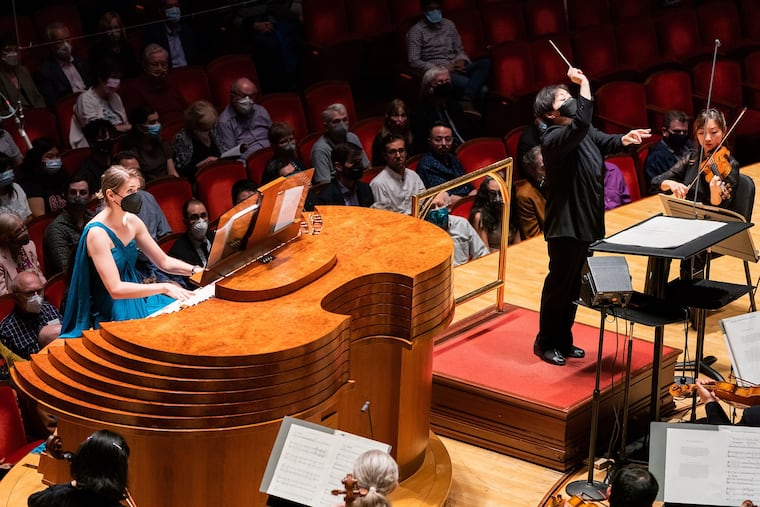What does it sound like when an iceberg breaks off from a glacier? This composer answers with a symphony.
The Philadelphia Orchestra this weekend listens in on global warming — and performs two of the repertoire's greatest works.

It’s called iceberg calving. The term describes a large chunk of ice shearing from the edge of a glacier. Thursday night the sound of the phenomenon crashed into the decidedly less naturalistic climes of Verizon Hall, its contours sculptured not from ice, but symphonic sound.
Melody Eötvös’ 10-minute work, When It Hits the Ocean Below, commissioned by the Philadelphia Orchestra and receiving its world premiere, indeed rolled out in impressive masses of sound. Paired with perhaps music’s best-loved river portrait, Smetana’s “The Moldau” from Má vlast, Eötvös’ score held the harsh, unyielding tension of water in solid form in contrast to the soft, life-giving ribbons of the Czech river.
The terrifying incidence of glaciers melting away is of course much on the minds of anyone concerned with global warming, and When It Hits the Ocean Below falls at the unlikely intersection of two major interests of the work’s commissioning benefactor, the Wyncote Foundation: the environment, and organs.
The instrument is a presence in Eötvös’ score — sometimes in the kind of large gobs of sound you expect from an organ, but also as a less obvious messenger of foreboding. The composer, an Australian with a doctorate from Indiana University, intended to signal the slow-motion aspect of calving with the extremely quiet note at the end of the third movement. As she correctly writes in the score, it’s a note so low that you feel it more than you hear it as realized on Verizon Hall’s Fred J. Cooper Memorial Organ, played here by Monica Czausz Berney.
But listeners aren’t bound to the literal, and a more poetic hearing of that sustained note was as a kind of tolling of human apathy, a warning sign you’d like to ignore but just can’t anymore. Is there any doubt the world is at a perilous third-movement moment?
Impressive as the orchestral effects were — delicate, glistening ice juxtaposed with shifting sound masses — a little less programmatic prose and a little more pure musical inspiration would have gone a long way. Still, Eötvös and the orchestra have seized on an important message with an effective vehicle at just the right moment.
Conductor Xian Zhang was a commanding presence in the work, as she was in “The Moldau,” which she seems to hear as a quickly moving waterway rather than meandering river. She had more chance for nuance in the Saint-Saëns Symphony No. 3 (“Organ”), and she seized it. I especially loved her expressive turns in the touching second movement.
Of course, there’s a lot with which to work in the Saint-Saëns, which remains one of the most astonishing concentrations of beauty in the repertoire. There’s nothing overtly programmatic about it, and nothing to link it with the natural world of the program’s other two works. But with its flying buttresses of sound, a great organ part (again, played beautifully by Berney) and a theme that hints at the plainchant Dies Irae, spirituality shines through much of the score.
The piece has no more flattering advocate than this orchestra, both historically and today. The strings in the second movement glowed. The enormous sunburst of sound opening the last movement is something we’re used to hearing. More notable, though, Zhang was able to maintain that intensity for the entire movement. Big fanfares grew bigger, opening up an idealized view to something bigger than us all, however you may define it.
Additional performance: Saturday at 8 p.m. in Verizon Hall, Broad and Spruce Streets. The concert includes a prelude of solo organ works played by Berney at 7 p.m. Tickets are $10-$165. philorch.org, 215-893-1999.